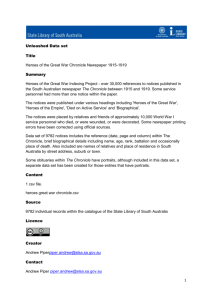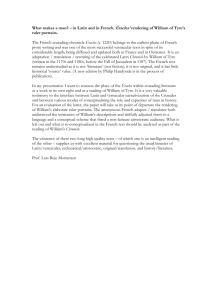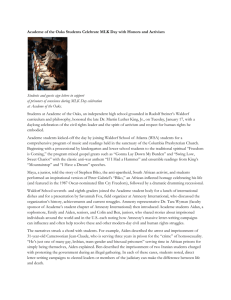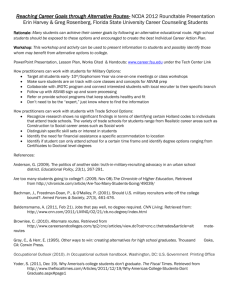Gender and Higher Education
advertisement
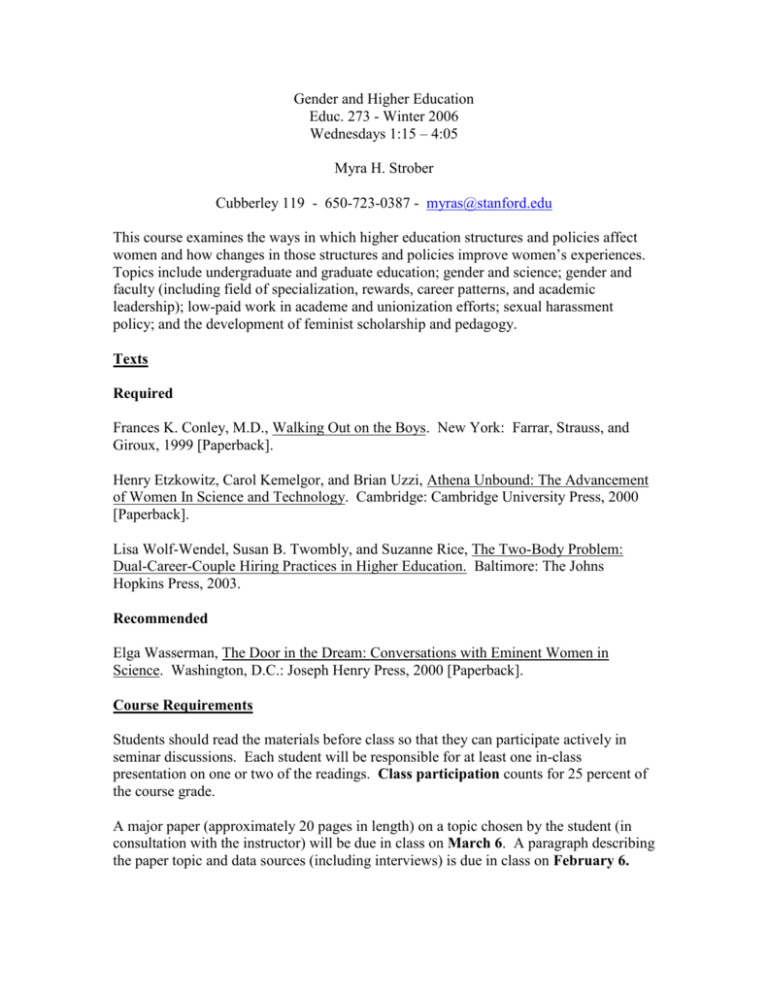
Gender and Higher Education Educ. 273 - Winter 2006 Wednesdays 1:15 – 4:05 Myra H. Strober Cubberley 119 - 650-723-0387 - myras@stanford.edu This course examines the ways in which higher education structures and policies affect women and how changes in those structures and policies improve women’s experiences. Topics include undergraduate and graduate education; gender and science; gender and faculty (including field of specialization, rewards, career patterns, and academic leadership); low-paid work in academe and unionization efforts; sexual harassment policy; and the development of feminist scholarship and pedagogy. Texts Required Frances K. Conley, M.D., Walking Out on the Boys. New York: Farrar, Strauss, and Giroux, 1999 [Paperback]. Henry Etzkowitz, Carol Kemelgor, and Brian Uzzi, Athena Unbound: The Advancement of Women In Science and Technology. Cambridge: Cambridge University Press, 2000 [Paperback]. Lisa Wolf-Wendel, Susan B. Twombly, and Suzanne Rice, The Two-Body Problem: Dual-Career-Couple Hiring Practices in Higher Education. Baltimore: The Johns Hopkins Press, 2003. Recommended Elga Wasserman, The Door in the Dream: Conversations with Eminent Women in Science. Washington, D.C.: Joseph Henry Press, 2000 [Paperback]. Course Requirements Students should read the materials before class so that they can participate actively in seminar discussions. Each student will be responsible for at least one in-class presentation on one or two of the readings. Class participation counts for 25 percent of the course grade. A major paper (approximately 20 pages in length) on a topic chosen by the student (in consultation with the instructor) will be due in class on March 6. A paragraph describing the paper topic and data sources (including interviews) is due in class on February 6. January 11- Introduction and Overview John Gravois, “Number of Doctorates Edges Up Slightly,” Chronicle of Higher Education, January 7, 2005, and accompanying tables. Thomas Bartlett, “Women Earn More Degrees Than Men, but Men Earn More Doctorates, Education Dept. Reports,” Chronicle of Higher Education, http://chronicle.com/daily/2001/12/2001122003n.htm Ph.D. Production in the US by Gender 1996-2000 – NSF WebCASPAR Database System. Compiled from Doctorate Records Files. January 18 and 25 – Gender, the Faculty, and Academic Leadership – Guest on January 25, Pat Jones, Professor of Biological Sciences and Vice Provost for Faculty Development, Stanford University Occupational Segregation and Discrimination Myra H. Strober and Lisa Catanzarite, "The Relative Attractiveness Theory of Occupational Segregation by Gender," Mitteilungen aus der Arbeitsmarkt- und Berufsforschung, 1994. Robin Wilson, “The ‘Feminization’ of Anthropology,” Chronicle of Higher Education, April 18, 2003. Marcia L. Bellas, "Disciplinary Differences in Faculty Salaries: Does Gender Bias Play a Role?" Journal of Higher Education 68(3), 1994, pp. 299-321. Donna K. Ginther and Shulamit Kahn, “Women in Economics: Moving Up or Falling Off the Academic Career Ladder?” Journal of Economic Perspectives, Summer 2004, pp. 193-214. Robert K. Toutkoushian and Valerie Martin Conley, “Progress for Women in Academe, Yet Inequities Persist: Evidence from NSPOF:99,” Research in Higher Education, February 2005, pp. 1-28. American Association of University Professors, “Inequities Persist for Women and NonTenure-Track Faculty: The Annual Report on the Economic Status of the Profession, 2004-05, Academe, March-April 2005, pp. 20-30. Judith Glazer-Raymo, Shattering the Myths: Women in Academe, Baltimore: The Johns Hopkins University Press, pp. 71-77 and 93-100 on legal action. Charlotte Fishman, “It Takes a Village to Create a Full Professor,” WAGE, Spring 2005, pp. 5-6. 2 Charlotte Fishman, “Teetering on the Family Friendly Edge: Discrimination Against Mothers in Academia,” www.CommonDreams.org, September 25, 2005. Work-Family Issues Lisa Wolf-Wendel, Susan B. Twombly, and Suzanne Rice, The Two-Body Problem: Dual-Career-Couple Hiring Practices in Higher Education. Baltimore: The Johns Hopkins Press, 2003. Mary Ann Mason and Marc Goulden, “Do Babies Matter? The Effect of Family Formation on the Lifelong Careers of Academic Men and Women,” Academe, November-December 2002, pp. 21-27. Mary Ann Mason and Marc Goulden, “Do Babies Matter? (Part II) Closing the Baby Gap,” Academe, November-December 2004, pp. 11-15. Robin Wilson, “Rigid Tenure System Hurts Young Professors, Especially Women, Officials from Top Universities Say,” Chronicle of Higher Education, September 26, 2005. Jan Yager, “Getting Back on Track: How to Find a Balance Between Work and Family,” Chronicle of Higher Education, July 26, 2005. Robin Wilson, “Working Half Time on the Tenure Track,” Chronicle of Higher Education, January 25, 2002. Sharon Lobel, “Working Part-Time After Tenure,” Academe, November-December 2004, pp. 35-38. Robin Wilson, “The Frustrating Career of the ‘Trailing Spouse,’” Chronicle of Higher Education, March 19, 1999. Robyn Wiegman, “On Being Married to the Institution,” Power, Race, and Gender in Academe: Strangers in the Tower? New York: The Modern Language Association, 2000, pp. 71-82. Leadership Mariam Chamberlain, “Women and Leadership in Higher Education,” in Cynthia B. Costello and Anne J. Stone (Eds.), The American Woman: 2001-2002: Getting to the Top. New York: W.W. Norton, 2001, pp. 63-86. Judith Glazer-Raymo, Shattering the Myths: Women in Academe, Baltimore: The Johns Hopkins University Press, Chapter 5 (“Women Who Lead,”) pp. 140-164. 3 February 1 -Gender and Graduate Education – Guest: Chris Golde, Senior Scholar and Research Director for the Carnegie Initiative on the Doctorate, (Carnegie Foundation for the Advancement of Teaching, Menlo Park) Lani Guinier, Becoming Gentlemen. Boston: Beacon Press, 1997, pp. 27-77. Evelyn Fox Keller, “The Anomaly of a Woman in Physics,” in Ruddick and Daniels (Eds.), Working It Out. New York: Pantheon, 1977, pp. 77-91. Maria Ong, “Playing with In/Visibility: How Minority Women Gain Power from the Margins of Science Culture,” Women in Higher Education, November 2001, pp. 42-44. “Students Give Failing Grade to Ph.D. Programs,” Women in Higher Education, March 2001, pp. 27-28. Wendy M. Williams, “Women in Academe, and the Men Who Derail Them,” Chronicle of Higher Education, July 20, 2001, p. B 19-20. February 8- Gender and Undergraduate Education Jerry A. Jacobs, “Gender Inequality and Higher Education,” Annual Review of Sociology, 1996. Leslie Miller-Bernal, Separate by Degree: Women Students’ Experiences in Single-Sex and Coeducational Colleges. New York: Peter Lang, 2000, pp. 201-230; 339-364. Robert E. Ledman, Marianne Miller, and Darrel R. Brown, “Successful Women and Women’s Colleges: Is There an Intervening Variable in the Reported Relationship?” Sex Roles, Vol. 233, Nos. 7/8, 1995. Cynthia Fuchs Epstein, “The Myths and Justifications of Sex Segregation in Higher Education: VMI and The Citadel,” Duke Journal of Gender Law and Policy, Spring 1997. “U. of Alabama Sororities Stay Segregated,” Women in Higher Education, November 2001. Deborah J. Anderson and John J. Cheslock, “Institutional Strategies to Achieve Gender Equity in Intercollegiate Athletics: Does Title IX Harm Male Athletes,” American Economic Association, Papers and Proceedings, May 2004, pp. 307-311. Welch Suggs, “New Federal Policy Eases Rules for Colleges to Prove Compliance with Title IX in Sports,” Chronicle of Higher Education, March 22, 2005. Sara Lipka, “Whistle-Blowers are Protected Under Title IX, Supreme Court Affirms,” Chronicle of Higher Education, March 30, 2005. 4 February 15- Gender and Science in the Academy Henry Etzkowitz, Carol Kemelgor, and Brian Uzzi, Athena Unbound: The Advancement of Women In Science and Technology. Cambridge: Cambridge University Press, 2000 Michelle Diament, “Petition Asks Congress to Take Action on Dearth of Women in Science, Math, and Engineering,” Chronicle of Higher Education, May 12, 2005. David F. Noble, “A World Without Women,” Technology Review, May/June 1992. Lawrence H. Summers, “Remarks at NBER Conference on Diversifying the Science and Engineering Workforce,” January 14, 2005. Harvard University, “Report of the Task Force on Women Faculty,” May 2005. Piper Fogg, “Harvard Panels Suggest Steps for Improving the Lot of Female Professors; Some Proposals Already Have Been Endorsed,” Chronicle of Higher Education, May 17, 2005. Jeanne Whalen and Sharon Begley, “Improved Formula: In England, Girls Are Closing Gap with Boys in Math; Making Class Interactive Has Side Effect: Females Thrive; Echoes of Harvard Debate; What It Means to Be ‘Innate,’” Wall Street Journal (Eastern Edition), March 30, 2005, p. A1. February 22- Sexual Harassment – Guest: Laraine Zappert, Director of Stanford’s Sexual Harassment Policy Office. Judith Berman Brandenburg, Confronting Sexual Harassment: What Schools and Colleges Can Do. New York: Teachers College Press, 1997, pp. 1-20 (“Defining the Problem and Its Scope”) and pp. 97-102 (“Frequently Asked Questions about Sexual Harassment and Schools”). Frances K. Conley, M.D., Walking Out on the Boys. New York: Farrar, Strauss, and Giroux, 1998, pp. 3-82. Kathy Witkowsky, “Code of Conduct: Air Force Academy Adopts Changes in Response to 2003 Sexual Assault Scandal,” National Cross-Talk (Published by the National Center for Public Policy and Higher Education), Fall 2004. Stanford University Office of Campus Relations, “Policy Revision Re Consensual Relationships,” October 2002. 5 March 1- Low Paid Work in Academe and Unionization Efforts John Hoerr, We Can’t Eat Prestige: The Women Who Organized Harvard. Philadelphia: Temple University Press, 1997, pp. ix, 1-18, 197-205, 209-231. Tahlman Krumm, Jr., “The Living Wage Movement Clashes with Campus Mission,” Trusteeship, November/December 2001, p. 7. N. Gregory Mankiw, “The Cost of a ‘Living Wage’: We Can’t Ignore Law of Supply and Demand,” Boston Globe, June 24, 2001, p. D8. Richard Freeman, “Á Fairer Sort of Harvard,” New York Times, December 22, 2001, p. 31. Susan C. Cass, “Labor-Management Partnerships for Working Families,” MIT Workplace Center, 2003. Scott Smallwood, “Here They Go Again: Yale U. Continues Its Pattern of Labor Woes,” Chronicle of Higher Education, March 14, 2003. March 8 -Feminist Scholarship and Pedagogy – Guest: Marilyn Boxer (San Francisco State University) Marilyn Boxer, When Women Ask the Questions: Creating Women’s Studies in America. (Baltimore, Johns Hopkins University Press, 1998), pp. 1-50; 64-65. Robin Wilson, “Ph.D. Programs in Women’s Studies Proliferate on the Campuses,” Chronicle of Higher Education, November 27, 1998; “Letters to the Editor on Assessing the ‘Distinguishing Features’ of Graduate Programs in Women’s Studies,” Chronicle of Higher Education, January 8, 1999. Myra H. Strober, “The Application of Mainstream Economics Constructs to Education: A Feminist Analysis,” in Marianne A. Ferber and Julie A. Nelson (Eds.), Feminist Economics Today: Beyond Economic Man. Chicago: University of Chicago Press, pp. 135-155. April Laskey Aerni, et.al, “Toward a Feminist Pedagogy in Economics,” Feminist Economics, March 1999, pp. 29-44. Adrienne Rich, “Toward a Woman-Centered University,” (1973-74) On Lies, Secrets and Silence: Selected Prose 1966-78. New York: W.W. Norton, 1995. March 15- Presentation of Selected Student Papers 6
